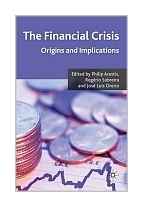|
||
• wydawnictwa polskie
• Zamów informacje o nowościach z wybranego tematu • kontakt
• Cookies na stronie |
THE FINANCIAL CRISIS: ORIGINS AND IMPLICATIONSARESTIS P. SOBREIRA R. OREIRO J.L. EDITORSwydawnictwo: PALGRAVE MACMILLAN , rok wydania 2011, wydanie Icena netto: net price + 5% vat. The 2008 financial crisis poses three fundamental questions for economists and
policy makers; understanding the origins of the crisis, understanding the consequences of
this crisis for the world economy, and finally understanding why the 2008 financial crisis
is not as serious as the 1929 crisis. The prevailing view is that the 2008 financial
crisis was solely the result of inadequate financial regulation together with a very loose
monetary policy conducted by central banks, especially the Fed. It is believed that this
crisis is a temporary detour in the normal course of the events, so that in the near
future capitalist economies will resume the high growth path observed before the crisis.
In terms of the third question, there is a widespread view that the fundamental reason
that explains the avoidance of the harmful experiences of 1929 was the fiscal and monetary
policy expansions in developed countries. No important role is assigned to developing
countries in terms of the effects of the financial crisis. PHILIP ARESTIS Cambridge Centre for Economics and Public Policy,
Department of Land Economy, University of Cambridge, UK; Professor of Economics,
Department of Applied Economics V, Universidad del País Vasco, Spain; Distinguished
Adjunct Professor of Economics, Department of Economics, University of Utah, US; Senior
Scholar, Levy Economics Institute, New York, US; Visiting Professor, Leeds Business
School, University of Leeds, UK; Professorial Research Associate, Department of Finance
and Management Studies, School of Oriental and African Studies (SOAS), University of
London, UK; and current holder of the British Hispanic Foundation 'Queen Victoria Eugenia'
British Hispanic Chair of Doctoral Studies. He is Chief Academic Adviser to the UK
Government Economic Service (GES) on Professional Developments in Economics. He has
published as sole author or editor, as well as co-author and co-editor, a number of books,
contributed in the form of invited chapters to numerous books, produced research reports
for research institutes, and has published widely in academic journals. Contents Introduction 288 pages, Hardcover Księgarnia nie działa. Nie odpowiadamy na pytania i nie realizujemy zamówien. Do odwolania !. |


